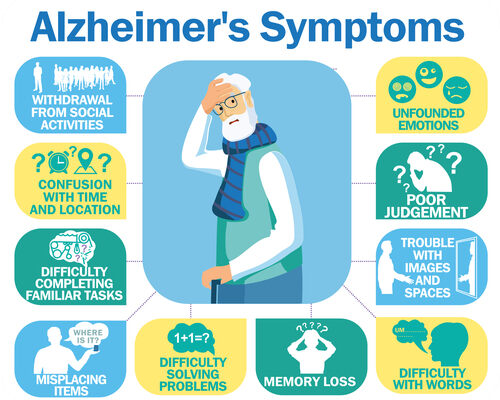In a momentous decision, an Alzheimers drug gets FDA approval, marking a major breakthrough in the battle against this debilitating disease.
Read more here: Feeling Down During Summer? It Might Be Summertime Depression
Alzheimers Drug Gets FDA Approval, Offering Hope For Patients And Families
This landmark decision has paved the way for an expansion in Medicare coverage, benefitting an estimated one million individuals in the early stages of Alzheimer’s.
Leqembi, jointly developed by Eisai and Biogen, initially received accelerated approval due to its impressive ability to clear amyloid plaques in the brain, a hallmark of Alzheimer’s disease.
However, limited accessibility arose from the Centers for Medicare and Medicaid Services (CMS) coverage decision and the drug’s high cost.
Thanks to the newly expanded Medicare coverage, individuals with confirmed amyloid plaques and early-stage Alzheimer’s will have access to Leqembi.
This significant milestone signifies a major advancement in the field of Alzheimer’s treatment.
Read more here: Australia Legalizes Psychedelics For Mental Health: A Groundbreaking Step Towards Holistic Treatment
Clinical trials have demonstrated that Leqembi can reduce cognitive decline by an extraordinary 27% and preserve brain function over 18 months.
The Alzheimer’s Association has expressed its support for the FDA’s approval, underscoring the potential benefits of Leqembi in helping individuals maintain their independence and engage in meaningful activities.
However, it is essential to note that the drug is not without side effects and necessitates regular brain imaging monitoring.
Accordingly, the FDA has issued a boxed warning to ensure that patients and caregivers are fully aware of the potential risks, such as brain swelling or bleeding.
Healthcare systems are diligently preparing for the broader utilization of Leqembi, which is administered through intravenous (IV) infusion every two weeks.
Infusion centers anticipate a surge in patient referrals and are proactively making necessary adjustments to accommodate the expected increase in demand.
Nevertheless, it is anticipated that not all eligible individuals will immediately seek the medication, and the number of recipients may gradually rise over time.
In response to the FDA’s approval, CMS has reaffirmed its unwavering commitment to providing timely access to innovative Alzheimer’s treatments.
It is important to note that Medicare recipients may still encounter out-of-pocket expenses associated with Leqembi, and the extent of coverage may vary for those enrolled in Medicare Advantage or supplemental plans.
CMS plans to collect real-world evidence through registries to evaluate the drug’s effectiveness among Medicare beneficiaries.
However, concerns have been raised by patient groups and the pharmaceutical industry regarding potential barriers to treatment.
While the expanded Medicare coverage of Leqembi and similar drugs will undoubtedly have a significant impact on program spending, it is crucial to address the rising costs.
The FDA’s full approval of Leqembi represents a momentous breakthrough in Alzheimer’s treatment, offering newfound hope and improved access to individuals in the early stages of the disease.
Despite the challenges that lie ahead, effective treatments are emerging, paving the way for a brighter future in the fight against Alzheimer’s.
Read more here: Can Trauma Cause Memory Loss? Understanding The Link Between The Two
Alzheimer’s Symptoms To Be Aware Of
Alzheimer’s disease, a progressive neurological disorder, manifests through various symptoms that gradually impair cognitive function and memory.
Individuals in the early stages of Alzheimer’s may experience mild symptoms, while the severity increases over time. Common symptoms include:

1. Memory Loss
Memory impairment is a common symptom of Alzheimer’s, causing difficulty in recalling recently learned information or significant events.
2. Confusion And Disorientation
Alzheimer’s patients may face disorientation, struggling to remember familiar places or recognize familiar faces. They can become easily lost, even in once-familiar surroundings.
3. Challenges In Problem-Solving
Alzheimer’s disease can cause impairments in planning, concentration, problem-solving, and decision-making abilities.
4. Language And Communication Problems
Individuals with Alzheimer’s often face difficulties in finding the appropriate words, comprehending conversations, and expressing their thoughts coherently.
5. Mood And Personality Changes
They may exhibit mood swings, irritability, anxiety, depression, and social withdrawal, necessitating understanding and support from caregivers and loved ones.
6. Decline In Judgment
Alzheimer’s patients may demonstrate impaired judgment, making impulsive decisions and becoming susceptible to scams or fraud. Caregivers and loved ones must offer guidance and protection to safeguard individuals with Alzheimer’s from financial exploitation.
7. Loss Of Initiative
Showing reduced motivation, decreased interest in hobbies or activities once enjoyed, and a general lack of initiative.
If you or someone you know experiences these symptoms, it is crucial to seek medical evaluation for an accurate diagnosis and appropriate care.
Early detection can facilitate effective management strategies and support for individuals and their families.









Leave a Reply
You must be logged in to post a comment.